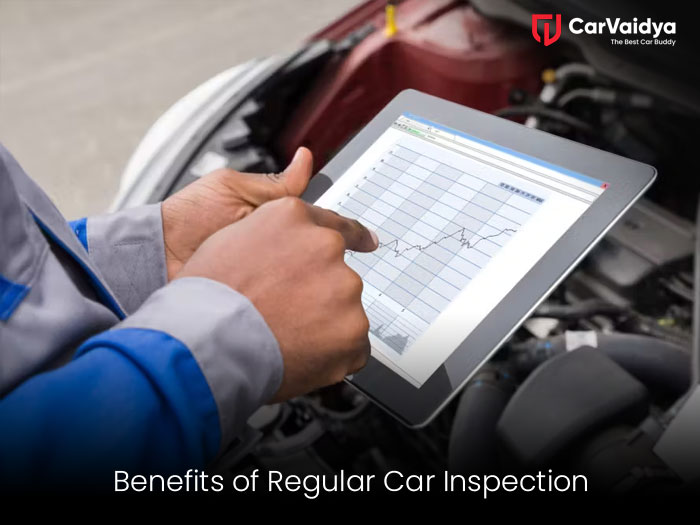Maintaining a vehicle is crucial for ensuring its longevity, safety, and performance. Regular car inspections are an integral part of vehicle maintenance, providing a structured approach to identify and rectify potential issues before they escalate. Here are five significant benefits of regular car inspections:
1. Enhanced Safety
Safety is paramount when it comes to driving, and regular car inspections play a critical role in ensuring the safety of both the driver and passengers. A comprehensive inspection covers essential safety components such as brakes, tires, lights, and steering mechanisms. By identifying and addressing issues with these components, inspections can prevent accidents caused by mechanical failures.
Brakes and Tires
The braking system is perhaps the most critical safety feature in any vehicle. Inspections ensure that brake pads, rotors, and fluids are in optimal condition. Similarly, tires are inspected for tread depth, pressure, and overall condition. Properly maintained brakes and tires can significantly reduce stopping distances and enhance vehicle control, especially in adverse weather conditions.
Lights and Signals
Visibility is crucial for safe driving, particularly at night or in poor weather. Inspections ensure that headlights, taillights, brake lights, and turn signals are functioning correctly. This not only helps the driver see the road but also ensures that other road users can see the vehicle and anticipate its movements.
2. Improved Performance and Efficiency
Regular inspections contribute to the overall performance and efficiency of a vehicle. By keeping the engine, transmission, and other vital systems in good condition, inspections help maintain the vehicle’s optimal performance levels.
Engine Health
The engine is the heart of any vehicle, and regular inspections help keep it running smoothly. Mechanics check for issues such as oil leaks, worn belts, and clogged filters. Addressing these issues promptly can prevent significant engine damage and maintain fuel efficiency.
Transmission and Drivetrain
The transmission and drivetrain are also crucial for vehicle performance. Inspections can identify problems such as low transmission fluid or worn-out components. Fixing these issues early can prevent costly repairs and ensure smooth gear shifts and power delivery.
3. Cost Savings
Regular car inspections can lead to significant cost savings by preventing major breakdowns and extending the lifespan of the vehicle. Identifying and fixing minor issues before they become major problems can save money in the long run.
Preventive Maintenance
Inspections act as a form of preventive maintenance, catching small issues before they escalate into more expensive repairs. For example, replacing a worn-out belt is much cheaper than dealing with the engine damage that could result from a snapped belt.
Extended Vehicle Lifespan
By keeping all components in good working order, regular inspections can extend the overall lifespan of a vehicle. This means that owners can enjoy their vehicles for longer, delaying the need for expensive replacements.
4. Environmental Benefits
Well-maintained vehicles are more environmentally friendly. Regular inspections ensure that a vehicle's emissions control systems are functioning properly, reducing the amount of harmful pollutants released into the atmosphere.
Emissions Control
Inspections include checks on the exhaust system and emissions controls, such as catalytic converters and oxygen sensors. Ensuring these components are working correctly helps the vehicle meet environmental standards and reduces its carbon footprint.
Fuel Efficiency
A well-maintained engine runs more efficiently, consuming less fuel and producing fewer emissions. Regularly inspecting and maintaining the engine, air filters, and fuel injectors can help achieve better fuel economy and lower emissions.
5. Compliance with Legal Requirements
In many regions, regular vehicle inspections are a legal requirement. These inspections ensure that vehicles meet the necessary safety and emissions standards set by local authorities.
Safety Inspections
Safety inspections are mandated in many areas to ensure that all vehicles on the road are safe to operate. These inspections typically include checks on critical systems like brakes, lights, and tires. Passing these inspections is often required for vehicle registration.
Emissions Testing
In addition to safety inspections, emissions testing is required in many places to control air pollution. Regular inspections help ensure that vehicles comply with emissions standards, preventing legal issues and fines for the owner.
Conclusion
Regular car inspections are an essential part of vehicle maintenance that offer numerous benefits, including enhanced safety, improved performance, cost savings, environmental protection, and compliance with legal requirements. By investing in regular inspections, vehicle owners can ensure that their cars remain reliable, efficient, and safe for years to come. In the long run, these inspections not only preserve the vehicle's value but also contribute to a safer and cleaner environment. Whether mandated by law or driven by personal commitment to safety and efficiency, regular car inspections are a wise choice for any vehicle owner.
You can read other articles
Increasing the Lifestyle of Your Car’s Clutch
Understanding and Addressing Issues with Spark Plugs in Cars
Four Indication That You’re Car AC Requires a Checkup

